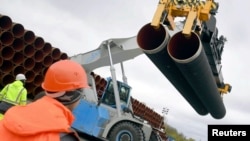Sparks fly and machines whir as workers busily prepare thousands of steel pipes that will become part of a vast undersea pipeline bringing gas from Russia to Germany's northeastern Baltic coast.
The Nord Stream 2 project will double the amount of natural gas Russia can funnel directly to the heart of Europe from newly tapped reserves in Siberia, intentionally skirting Eastern European nations like Poland and Ukraine. It also promises much-needed jobs in this poor German backwater, some three hours' drive north of Berlin.
The United States and some other German allies have bristled at the project, warning that it could give Moscow greater leverage over Western Europe.
Energy-poor Germany already relies heavily on Russian gas and so far Chancellor Angela Merkel has deftly kept the new $11 billion pipeline off the table while imposing sanctions against Russia for its actions in Ukraine.
But as plans become closer to reality, the pressure has increased on her, and last month after meetings with Ukrainian President Petro Poroshenko she acknowledged that Nord Stream 2 was more than just a business project, saying that "political factors have to be taken into account."
With Merkel heading to Sochi on Friday for talks with Russian President Vladimir Putin, a senior U.S. diplomat warned that proceeding with the project could result in sanctions for those involved.
"We would be delighted if the project did not take place," U.S. Deputy Assistant Secretary Sandra Oudkirk, an energy policy expert in the State Department, told reporters in Berlin on Thursday.
She said Washington is concerned Nord Stream 2 could increase Russia's "malign influence" in Europe.
Oudkirk said the new pipeline would divert gas flows away from Ukraine, which depends heavily on transit fees, and could become a pathway for Russia to install surveillance equipment in the Baltic Sea, a sensitive military region.
She said the U.S. is "exerting as much persuasive power" as it can to stop the project, and noted that Congress has given the U.S. administration explicit authority to impose sanctions in connection with Russian pipeline projects if necessary.
"Any pipeline project — and there are many multiple pipeline projects in the world that are potentially covered by this sanctions authority — is in an elevated position of sanctions risk," she said.
Jens Mueller, a spokesman for Nord Stream 2, dismissed concerns from the U.S. and several European countries, saying the new pipeline would merely be one of many sources of natural gas for Europe.
"This pipeline can't be used to blackmail or negatively affect any country," he told The Associated Press in an interview.
Merkel's trip to the Black Sea resort of Sochi, her first visit to Russia in a year, will be a diplomatic balancing act.
While the German leader has taken a hard line on Russian actions in recent years — from the conflicts in Ukraine and Syria to the chemical attack on a former Russian spy in Britain — Germany badly needs to secure its gas supply and Berlin has calculated that Nord Stream 2 offers the best deal.
Europe's biggest economy is also the world's biggest importer of natural gas. According to Kirsten Westphal, an energy policy expert at the German Institute for International and Security Affairs, said its import needs are likely to grow.
Germany's chemical industry alone uses more gas than the country of Denmark. Chemical giant BASF is a major investor in Nord Stream 2.
Under Merkel, Germany has also set itself an ambitious goal of switching off all nuclear plants by 2022. While renewable power is on the rise, coal forms the bedrock of Germany's energy mix, a fact that's not compatible with the country's pledge to sharply reduce carbon emissions.
"If you want to take climate goals seriously then gas is simply an important source of energy," said Westphal.
From the end of 2019 when it's to go online, the twin pipes of Nord Stream 2 will pump up to 55 billion cubic meters of gas to Western Europe each year, the same as its predecessor Nord Stream 1, which runs from the Russian city of Vyborg under the Baltic to the German city of Greifswald. The additional gas is needed to fill a projected decline in supply from Norway and the Netherlands, as their reserves wane.
The aging Ukrainian Gas Transmission System, meanwhile, is a Soviet-era relic in bad need of upgrading and unlikely to be competitive in the foreseeable future. Its loss would be a severe blow to Kiev, which earns up to 2 billion euros ($2.35 billion) a year from transit fees — some 2 percent of the country's gross domestic product.
A deal that keeps Kiev in the mix could help normalize relations between Ukraine and Russia, Moscow and Berlin.
"A compromise could be that on the one hand the pipeline project isn't blocked any further," said Claudia Kemfert, a senior energy expert at the German Institute for Economic Research. "On the other hand Russia would commit itself to keep using the gas route through Ukraine, so that all sides have a face-saving result."
Merkel's spokesman Steffen Seibert indicated that some of the gas that passed through Ukraine's pipes last year — over 90 billion cubic meters — will keep flowing in future.
"In the end, but we're not there yet, it will also be about the volume of gas transiting [through Ukraine]," he said.
"Of course it makes a difference how many billion cubic meters it is. But I can't give you a target number. We believe it needs to be resolved in talks and we hope that, piece by piece, things will move forward."




